Analyzing the Role of STEM and Humanities in University Education
VerifiedAdded on 2022/09/18
|7
|1724
|24
Essay
AI Summary
This essay critically analyzes the ongoing debate surrounding the relative importance of STEM (Science, Technology, Engineering, and Mathematics) and humanities subjects in university education. It begins by defining STEM subjects and highlighting their significance in fostering competitiveness and providing a foundation for various careers, including research, medicine, engineering, and accounting. The essay also acknowledges the importance of vocational courses that complement STEM fields. Conversely, it explores the value of humanities subjects, such as literature, arts, history, and philosophy, in promoting empathy, critical thinking, and an understanding of diverse cultures. The essay argues that a balanced approach, integrating both STEM and humanities, is crucial for holistic education, enabling students to develop a well-rounded personality equipped to address the complexities of the modern world. It concludes by emphasizing the need for universities to prioritize this balance to prepare students for the challenges of today's society, highlighting the need for a fusion between these two areas.
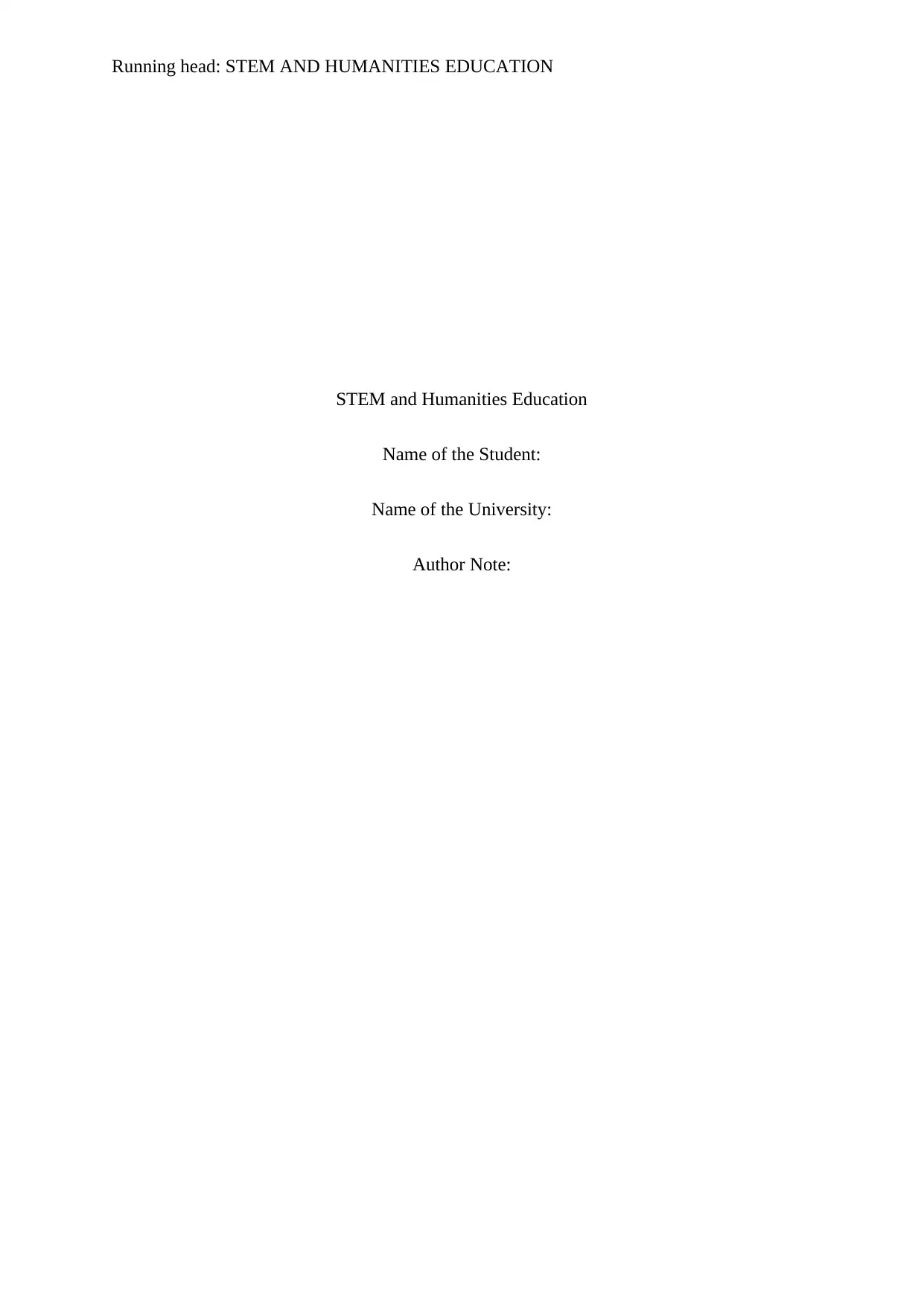
Running head: STEM AND HUMANITIES EDUCATION
STEM and Humanities Education
Name of the Student:
Name of the University:
Author Note:
STEM and Humanities Education
Name of the Student:
Name of the University:
Author Note:
Paraphrase This Document
Need a fresh take? Get an instant paraphrase of this document with our AI Paraphraser
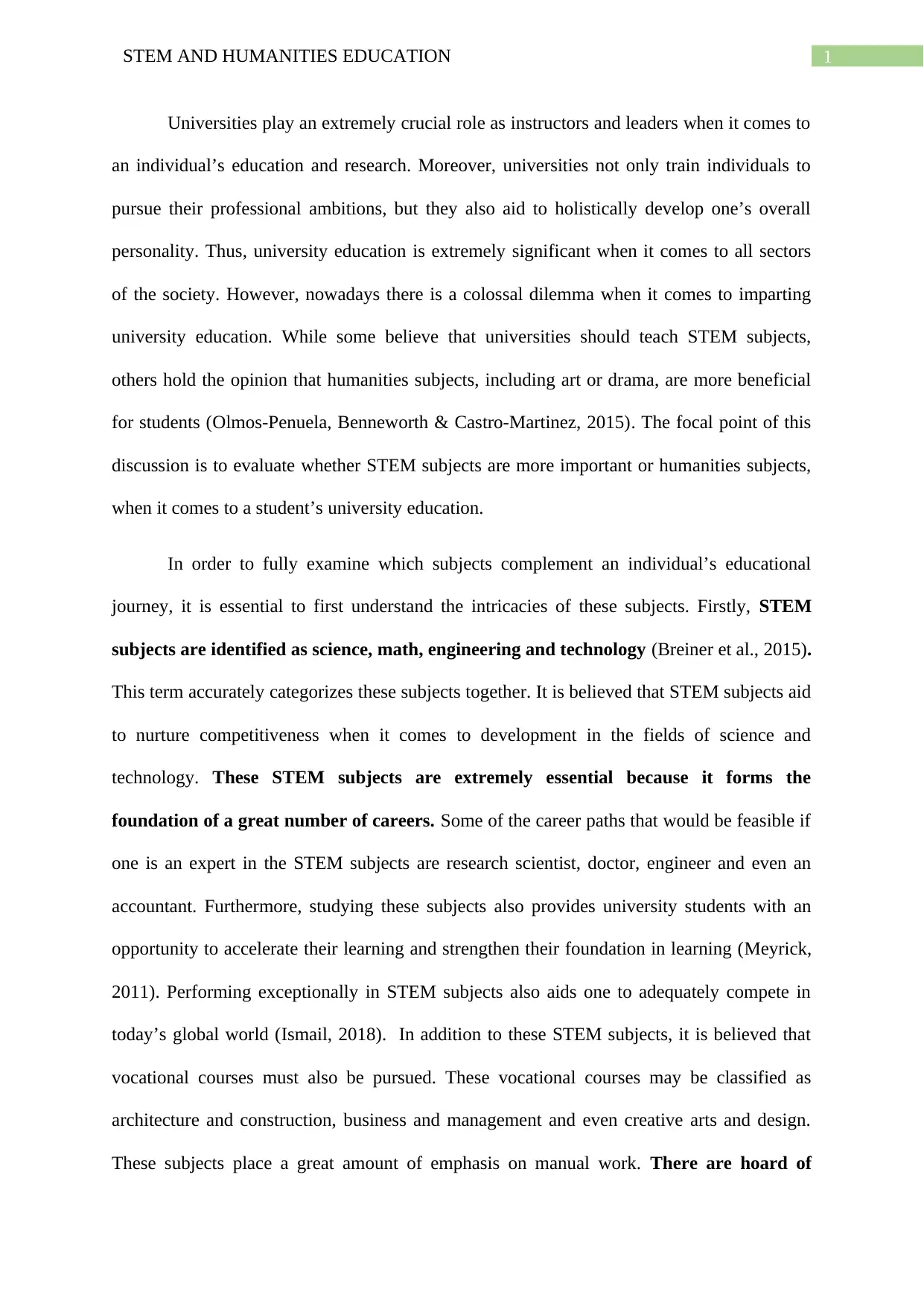
1STEM AND HUMANITIES EDUCATION
Universities play an extremely crucial role as instructors and leaders when it comes to
an individual’s education and research. Moreover, universities not only train individuals to
pursue their professional ambitions, but they also aid to holistically develop one’s overall
personality. Thus, university education is extremely significant when it comes to all sectors
of the society. However, nowadays there is a colossal dilemma when it comes to imparting
university education. While some believe that universities should teach STEM subjects,
others hold the opinion that humanities subjects, including art or drama, are more beneficial
for students (Olmos-Penuela, Benneworth & Castro-Martinez, 2015). The focal point of this
discussion is to evaluate whether STEM subjects are more important or humanities subjects,
when it comes to a student’s university education.
In order to fully examine which subjects complement an individual’s educational
journey, it is essential to first understand the intricacies of these subjects. Firstly, STEM
subjects are identified as science, math, engineering and technology (Breiner et al., 2015).
This term accurately categorizes these subjects together. It is believed that STEM subjects aid
to nurture competitiveness when it comes to development in the fields of science and
technology. These STEM subjects are extremely essential because it forms the
foundation of a great number of careers. Some of the career paths that would be feasible if
one is an expert in the STEM subjects are research scientist, doctor, engineer and even an
accountant. Furthermore, studying these subjects also provides university students with an
opportunity to accelerate their learning and strengthen their foundation in learning (Meyrick,
2011). Performing exceptionally in STEM subjects also aids one to adequately compete in
today’s global world (Ismail, 2018). In addition to these STEM subjects, it is believed that
vocational courses must also be pursued. These vocational courses may be classified as
architecture and construction, business and management and even creative arts and design.
These subjects place a great amount of emphasis on manual work. There are hoard of
Universities play an extremely crucial role as instructors and leaders when it comes to
an individual’s education and research. Moreover, universities not only train individuals to
pursue their professional ambitions, but they also aid to holistically develop one’s overall
personality. Thus, university education is extremely significant when it comes to all sectors
of the society. However, nowadays there is a colossal dilemma when it comes to imparting
university education. While some believe that universities should teach STEM subjects,
others hold the opinion that humanities subjects, including art or drama, are more beneficial
for students (Olmos-Penuela, Benneworth & Castro-Martinez, 2015). The focal point of this
discussion is to evaluate whether STEM subjects are more important or humanities subjects,
when it comes to a student’s university education.
In order to fully examine which subjects complement an individual’s educational
journey, it is essential to first understand the intricacies of these subjects. Firstly, STEM
subjects are identified as science, math, engineering and technology (Breiner et al., 2015).
This term accurately categorizes these subjects together. It is believed that STEM subjects aid
to nurture competitiveness when it comes to development in the fields of science and
technology. These STEM subjects are extremely essential because it forms the
foundation of a great number of careers. Some of the career paths that would be feasible if
one is an expert in the STEM subjects are research scientist, doctor, engineer and even an
accountant. Furthermore, studying these subjects also provides university students with an
opportunity to accelerate their learning and strengthen their foundation in learning (Meyrick,
2011). Performing exceptionally in STEM subjects also aids one to adequately compete in
today’s global world (Ismail, 2018). In addition to these STEM subjects, it is believed that
vocational courses must also be pursued. These vocational courses may be classified as
architecture and construction, business and management and even creative arts and design.
These subjects place a great amount of emphasis on manual work. There are hoard of
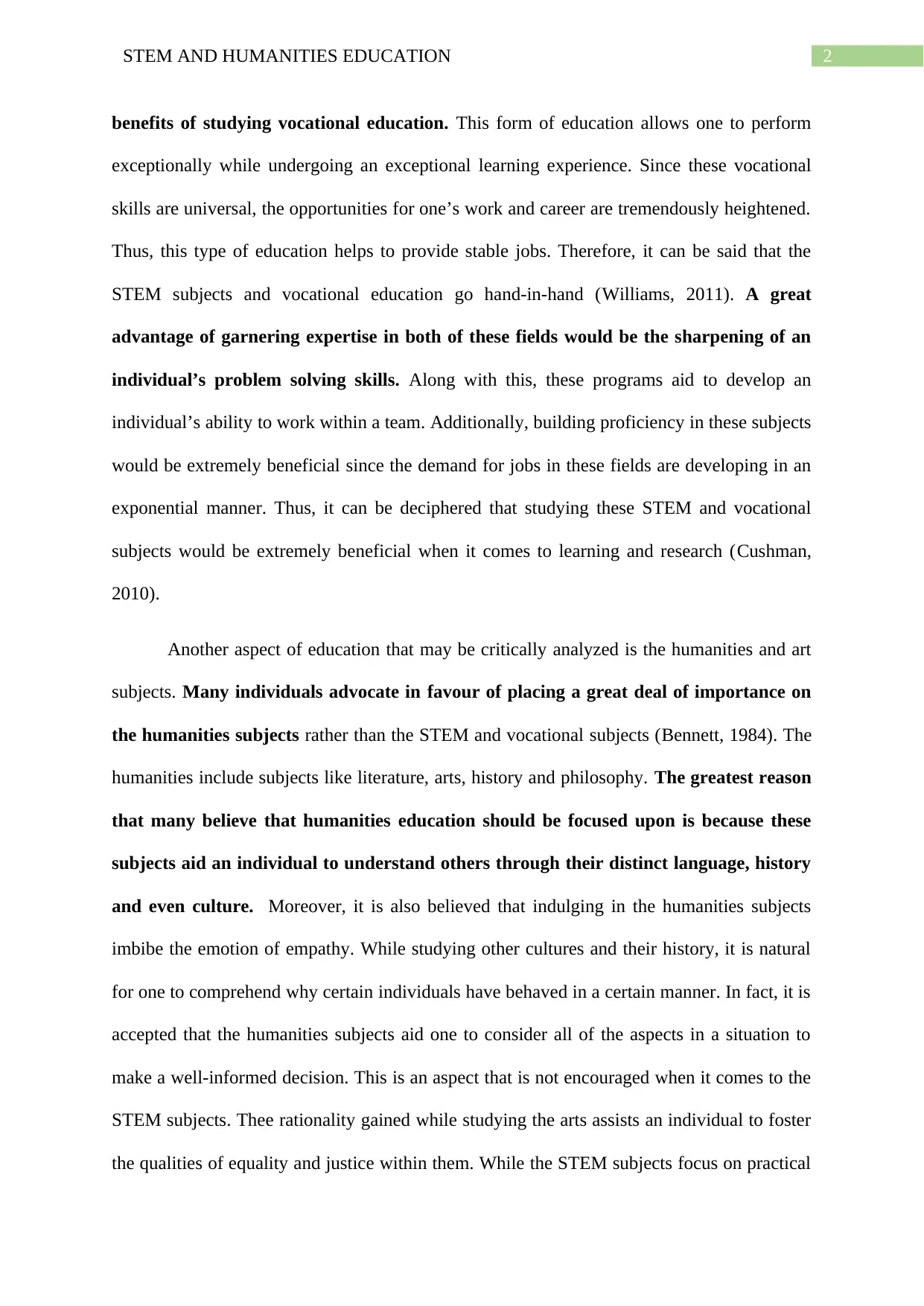
2STEM AND HUMANITIES EDUCATION
benefits of studying vocational education. This form of education allows one to perform
exceptionally while undergoing an exceptional learning experience. Since these vocational
skills are universal, the opportunities for one’s work and career are tremendously heightened.
Thus, this type of education helps to provide stable jobs. Therefore, it can be said that the
STEM subjects and vocational education go hand-in-hand (Williams, 2011). A great
advantage of garnering expertise in both of these fields would be the sharpening of an
individual’s problem solving skills. Along with this, these programs aid to develop an
individual’s ability to work within a team. Additionally, building proficiency in these subjects
would be extremely beneficial since the demand for jobs in these fields are developing in an
exponential manner. Thus, it can be deciphered that studying these STEM and vocational
subjects would be extremely beneficial when it comes to learning and research (Cushman,
2010).
Another aspect of education that may be critically analyzed is the humanities and art
subjects. Many individuals advocate in favour of placing a great deal of importance on
the humanities subjects rather than the STEM and vocational subjects (Bennett, 1984). The
humanities include subjects like literature, arts, history and philosophy. The greatest reason
that many believe that humanities education should be focused upon is because these
subjects aid an individual to understand others through their distinct language, history
and even culture. Moreover, it is also believed that indulging in the humanities subjects
imbibe the emotion of empathy. While studying other cultures and their history, it is natural
for one to comprehend why certain individuals have behaved in a certain manner. In fact, it is
accepted that the humanities subjects aid one to consider all of the aspects in a situation to
make a well-informed decision. This is an aspect that is not encouraged when it comes to the
STEM subjects. Thee rationality gained while studying the arts assists an individual to foster
the qualities of equality and justice within them. While the STEM subjects focus on practical
benefits of studying vocational education. This form of education allows one to perform
exceptionally while undergoing an exceptional learning experience. Since these vocational
skills are universal, the opportunities for one’s work and career are tremendously heightened.
Thus, this type of education helps to provide stable jobs. Therefore, it can be said that the
STEM subjects and vocational education go hand-in-hand (Williams, 2011). A great
advantage of garnering expertise in both of these fields would be the sharpening of an
individual’s problem solving skills. Along with this, these programs aid to develop an
individual’s ability to work within a team. Additionally, building proficiency in these subjects
would be extremely beneficial since the demand for jobs in these fields are developing in an
exponential manner. Thus, it can be deciphered that studying these STEM and vocational
subjects would be extremely beneficial when it comes to learning and research (Cushman,
2010).
Another aspect of education that may be critically analyzed is the humanities and art
subjects. Many individuals advocate in favour of placing a great deal of importance on
the humanities subjects rather than the STEM and vocational subjects (Bennett, 1984). The
humanities include subjects like literature, arts, history and philosophy. The greatest reason
that many believe that humanities education should be focused upon is because these
subjects aid an individual to understand others through their distinct language, history
and even culture. Moreover, it is also believed that indulging in the humanities subjects
imbibe the emotion of empathy. While studying other cultures and their history, it is natural
for one to comprehend why certain individuals have behaved in a certain manner. In fact, it is
accepted that the humanities subjects aid one to consider all of the aspects in a situation to
make a well-informed decision. This is an aspect that is not encouraged when it comes to the
STEM subjects. Thee rationality gained while studying the arts assists an individual to foster
the qualities of equality and justice within them. While the STEM subjects focus on practical
⊘ This is a preview!⊘
Do you want full access?
Subscribe today to unlock all pages.

Trusted by 1+ million students worldwide
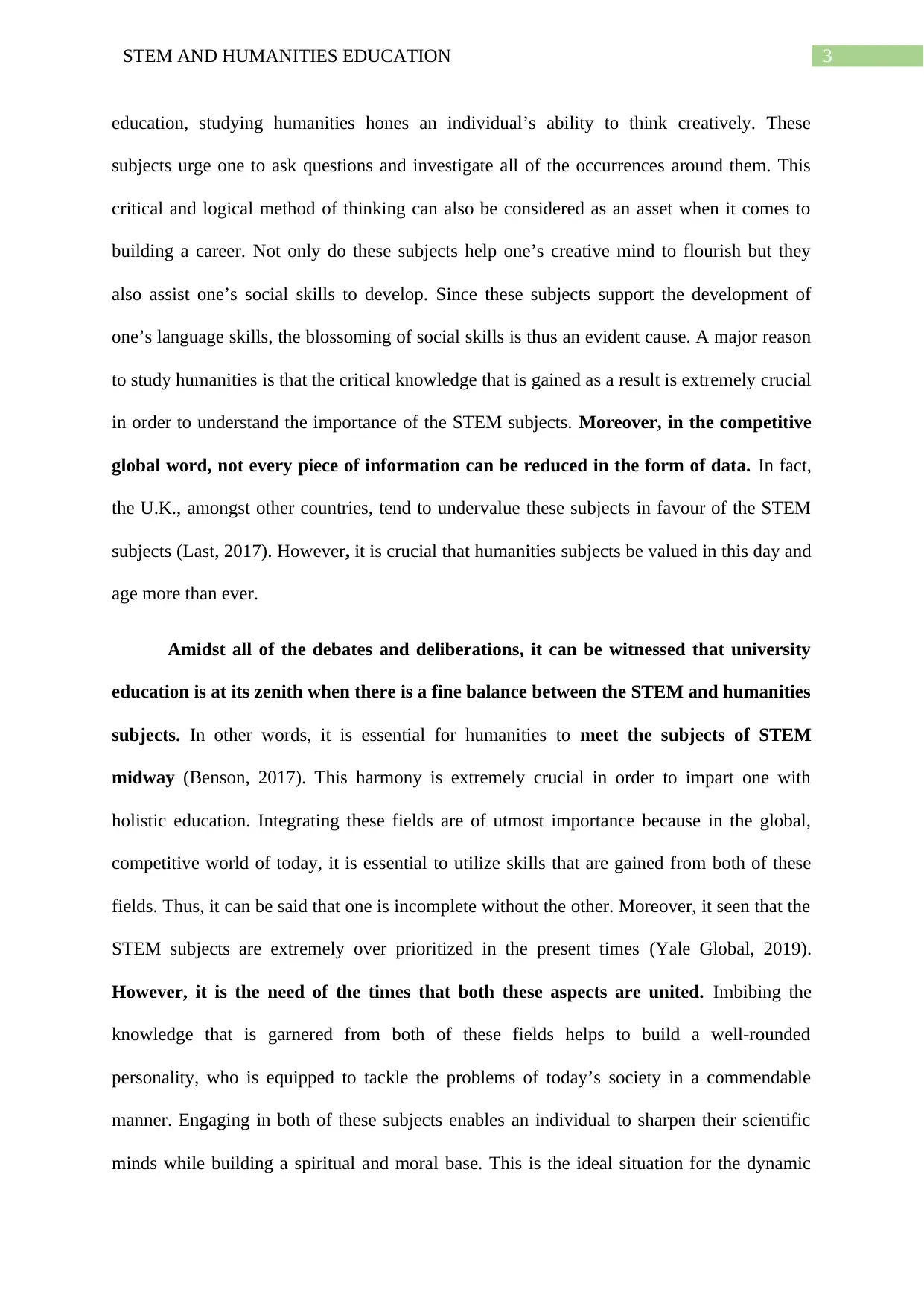
3STEM AND HUMANITIES EDUCATION
education, studying humanities hones an individual’s ability to think creatively. These
subjects urge one to ask questions and investigate all of the occurrences around them. This
critical and logical method of thinking can also be considered as an asset when it comes to
building a career. Not only do these subjects help one’s creative mind to flourish but they
also assist one’s social skills to develop. Since these subjects support the development of
one’s language skills, the blossoming of social skills is thus an evident cause. A major reason
to study humanities is that the critical knowledge that is gained as a result is extremely crucial
in order to understand the importance of the STEM subjects. Moreover, in the competitive
global word, not every piece of information can be reduced in the form of data. In fact,
the U.K., amongst other countries, tend to undervalue these subjects in favour of the STEM
subjects (Last, 2017). However, it is crucial that humanities subjects be valued in this day and
age more than ever.
Amidst all of the debates and deliberations, it can be witnessed that university
education is at its zenith when there is a fine balance between the STEM and humanities
subjects. In other words, it is essential for humanities to meet the subjects of STEM
midway (Benson, 2017). This harmony is extremely crucial in order to impart one with
holistic education. Integrating these fields are of utmost importance because in the global,
competitive world of today, it is essential to utilize skills that are gained from both of these
fields. Thus, it can be said that one is incomplete without the other. Moreover, it seen that the
STEM subjects are extremely over prioritized in the present times (Yale Global, 2019).
However, it is the need of the times that both these aspects are united. Imbibing the
knowledge that is garnered from both of these fields helps to build a well-rounded
personality, who is equipped to tackle the problems of today’s society in a commendable
manner. Engaging in both of these subjects enables an individual to sharpen their scientific
minds while building a spiritual and moral base. This is the ideal situation for the dynamic
education, studying humanities hones an individual’s ability to think creatively. These
subjects urge one to ask questions and investigate all of the occurrences around them. This
critical and logical method of thinking can also be considered as an asset when it comes to
building a career. Not only do these subjects help one’s creative mind to flourish but they
also assist one’s social skills to develop. Since these subjects support the development of
one’s language skills, the blossoming of social skills is thus an evident cause. A major reason
to study humanities is that the critical knowledge that is gained as a result is extremely crucial
in order to understand the importance of the STEM subjects. Moreover, in the competitive
global word, not every piece of information can be reduced in the form of data. In fact,
the U.K., amongst other countries, tend to undervalue these subjects in favour of the STEM
subjects (Last, 2017). However, it is crucial that humanities subjects be valued in this day and
age more than ever.
Amidst all of the debates and deliberations, it can be witnessed that university
education is at its zenith when there is a fine balance between the STEM and humanities
subjects. In other words, it is essential for humanities to meet the subjects of STEM
midway (Benson, 2017). This harmony is extremely crucial in order to impart one with
holistic education. Integrating these fields are of utmost importance because in the global,
competitive world of today, it is essential to utilize skills that are gained from both of these
fields. Thus, it can be said that one is incomplete without the other. Moreover, it seen that the
STEM subjects are extremely over prioritized in the present times (Yale Global, 2019).
However, it is the need of the times that both these aspects are united. Imbibing the
knowledge that is garnered from both of these fields helps to build a well-rounded
personality, who is equipped to tackle the problems of today’s society in a commendable
manner. Engaging in both of these subjects enables an individual to sharpen their scientific
minds while building a spiritual and moral base. This is the ideal situation for the dynamic
Paraphrase This Document
Need a fresh take? Get an instant paraphrase of this document with our AI Paraphraser
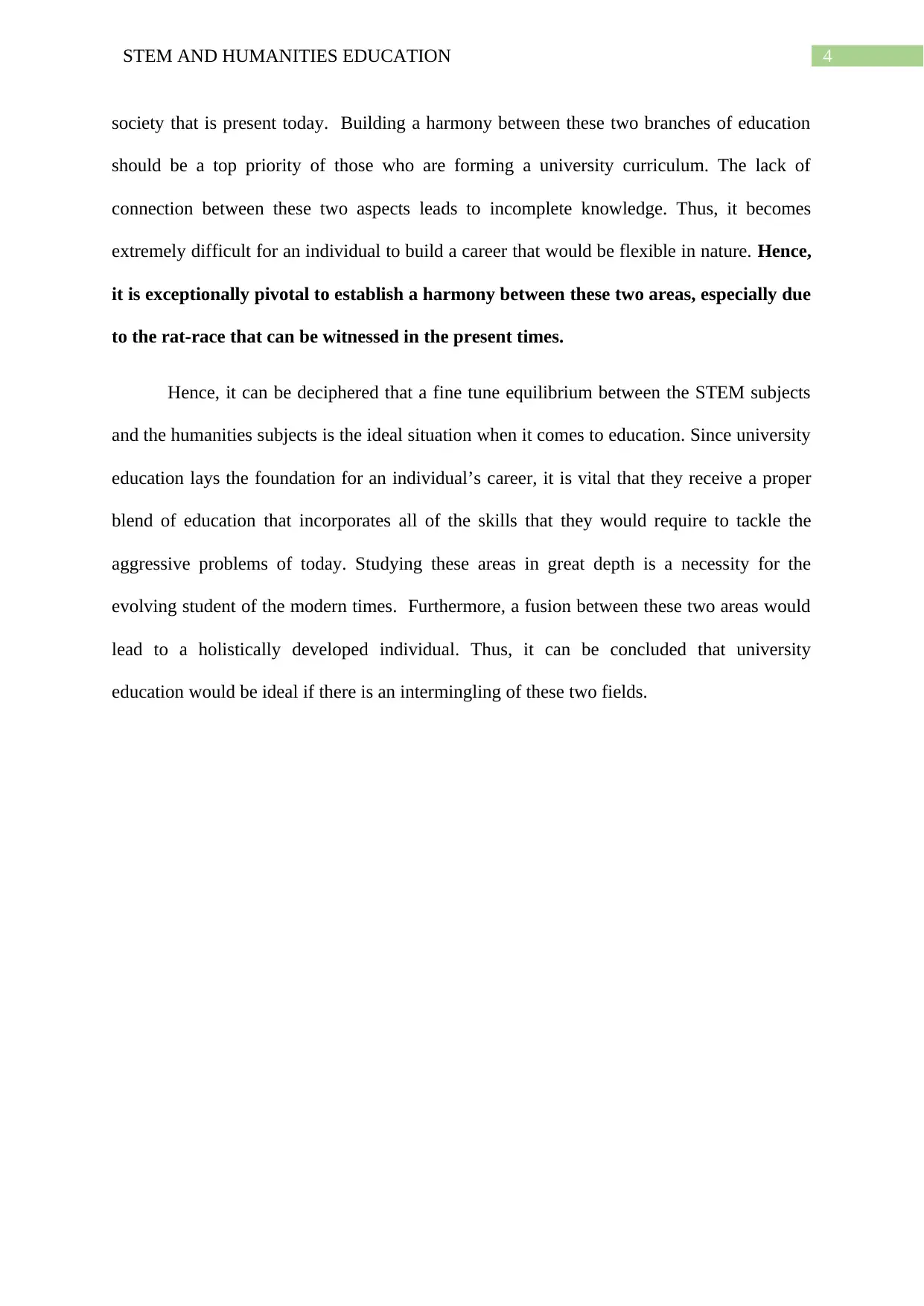
4STEM AND HUMANITIES EDUCATION
society that is present today. Building a harmony between these two branches of education
should be a top priority of those who are forming a university curriculum. The lack of
connection between these two aspects leads to incomplete knowledge. Thus, it becomes
extremely difficult for an individual to build a career that would be flexible in nature. Hence,
it is exceptionally pivotal to establish a harmony between these two areas, especially due
to the rat-race that can be witnessed in the present times.
Hence, it can be deciphered that a fine tune equilibrium between the STEM subjects
and the humanities subjects is the ideal situation when it comes to education. Since university
education lays the foundation for an individual’s career, it is vital that they receive a proper
blend of education that incorporates all of the skills that they would require to tackle the
aggressive problems of today. Studying these areas in great depth is a necessity for the
evolving student of the modern times. Furthermore, a fusion between these two areas would
lead to a holistically developed individual. Thus, it can be concluded that university
education would be ideal if there is an intermingling of these two fields.
society that is present today. Building a harmony between these two branches of education
should be a top priority of those who are forming a university curriculum. The lack of
connection between these two aspects leads to incomplete knowledge. Thus, it becomes
extremely difficult for an individual to build a career that would be flexible in nature. Hence,
it is exceptionally pivotal to establish a harmony between these two areas, especially due
to the rat-race that can be witnessed in the present times.
Hence, it can be deciphered that a fine tune equilibrium between the STEM subjects
and the humanities subjects is the ideal situation when it comes to education. Since university
education lays the foundation for an individual’s career, it is vital that they receive a proper
blend of education that incorporates all of the skills that they would require to tackle the
aggressive problems of today. Studying these areas in great depth is a necessity for the
evolving student of the modern times. Furthermore, a fusion between these two areas would
lead to a holistically developed individual. Thus, it can be concluded that university
education would be ideal if there is an intermingling of these two fields.
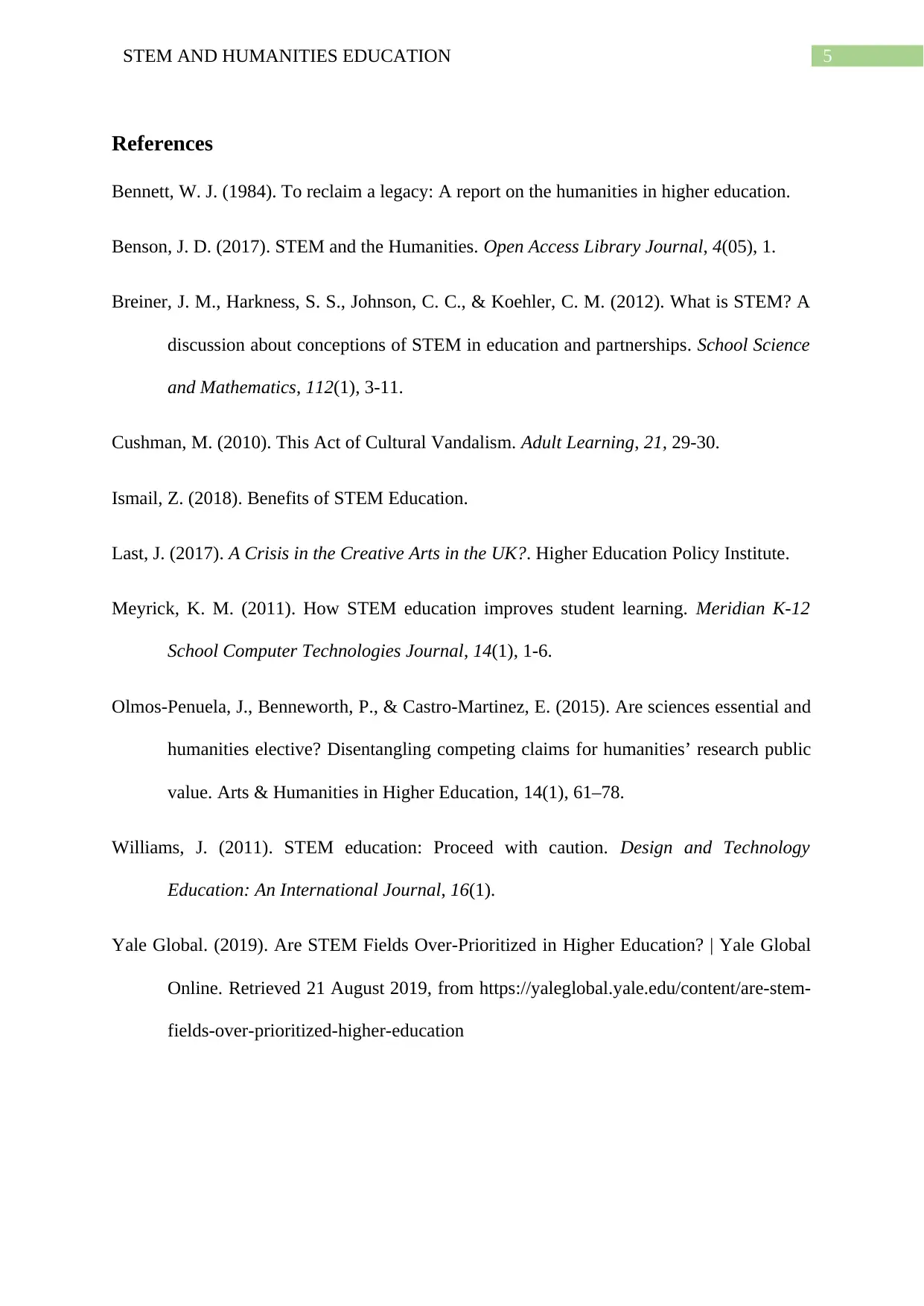
5STEM AND HUMANITIES EDUCATION
References
Bennett, W. J. (1984). To reclaim a legacy: A report on the humanities in higher education.
Benson, J. D. (2017). STEM and the Humanities. Open Access Library Journal, 4(05), 1.
Breiner, J. M., Harkness, S. S., Johnson, C. C., & Koehler, C. M. (2012). What is STEM? A
discussion about conceptions of STEM in education and partnerships. School Science
and Mathematics, 112(1), 3-11.
Cushman, M. (2010). This Act of Cultural Vandalism. Adult Learning, 21, 29-30.
Ismail, Z. (2018). Benefits of STEM Education.
Last, J. (2017). A Crisis in the Creative Arts in the UK?. Higher Education Policy Institute.
Meyrick, K. M. (2011). How STEM education improves student learning. Meridian K-12
School Computer Technologies Journal, 14(1), 1-6.
Olmos-Penuela, J., Benneworth, P., & Castro-Martinez, E. (2015). Are sciences essential and
humanities elective? Disentangling competing claims for humanities’ research public
value. Arts & Humanities in Higher Education, 14(1), 61–78.
Williams, J. (2011). STEM education: Proceed with caution. Design and Technology
Education: An International Journal, 16(1).
Yale Global. (2019). Are STEM Fields Over-Prioritized in Higher Education? | Yale Global
Online. Retrieved 21 August 2019, from https://yaleglobal.yale.edu/content/are-stem-
fields-over-prioritized-higher-education
References
Bennett, W. J. (1984). To reclaim a legacy: A report on the humanities in higher education.
Benson, J. D. (2017). STEM and the Humanities. Open Access Library Journal, 4(05), 1.
Breiner, J. M., Harkness, S. S., Johnson, C. C., & Koehler, C. M. (2012). What is STEM? A
discussion about conceptions of STEM in education and partnerships. School Science
and Mathematics, 112(1), 3-11.
Cushman, M. (2010). This Act of Cultural Vandalism. Adult Learning, 21, 29-30.
Ismail, Z. (2018). Benefits of STEM Education.
Last, J. (2017). A Crisis in the Creative Arts in the UK?. Higher Education Policy Institute.
Meyrick, K. M. (2011). How STEM education improves student learning. Meridian K-12
School Computer Technologies Journal, 14(1), 1-6.
Olmos-Penuela, J., Benneworth, P., & Castro-Martinez, E. (2015). Are sciences essential and
humanities elective? Disentangling competing claims for humanities’ research public
value. Arts & Humanities in Higher Education, 14(1), 61–78.
Williams, J. (2011). STEM education: Proceed with caution. Design and Technology
Education: An International Journal, 16(1).
Yale Global. (2019). Are STEM Fields Over-Prioritized in Higher Education? | Yale Global
Online. Retrieved 21 August 2019, from https://yaleglobal.yale.edu/content/are-stem-
fields-over-prioritized-higher-education
⊘ This is a preview!⊘
Do you want full access?
Subscribe today to unlock all pages.

Trusted by 1+ million students worldwide

6STEM AND HUMANITIES EDUCATION
1 out of 7
Related Documents
Your All-in-One AI-Powered Toolkit for Academic Success.
+13062052269
info@desklib.com
Available 24*7 on WhatsApp / Email
![[object Object]](/_next/static/media/star-bottom.7253800d.svg)
Unlock your academic potential
Copyright © 2020–2026 A2Z Services. All Rights Reserved. Developed and managed by ZUCOL.




